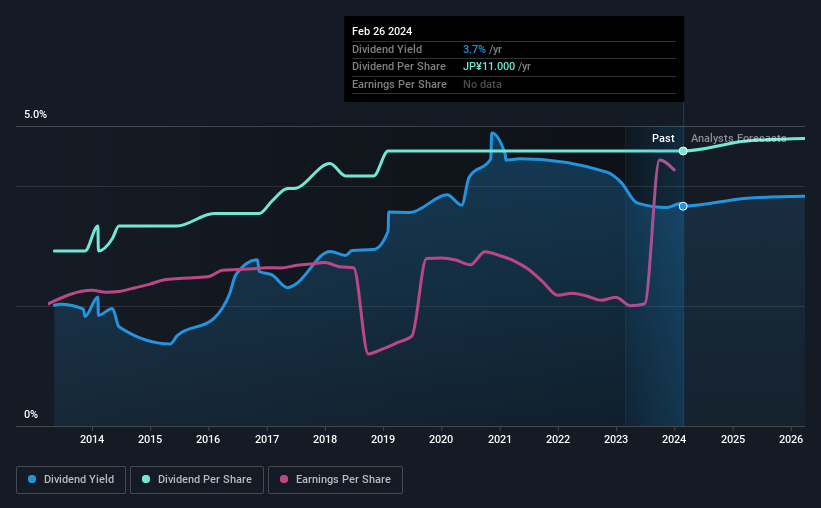
Seven Bank, Ltd. (TSE:8410) has announced that it will pay a dividend of ¥5.50 per share on the 3rd of June. This means the dividend yield will be fairly typical at 3.7%.
See our latest analysis for Seven Bank
Seven Bank's Earnings Will Easily Cover The Distributions
Solid dividend yields are great, but they only really help us if the payment is sustainable.
Having distributed dividends for at least 10 years, Seven Bank has a long history of paying out a part of its earnings to shareholders. Past distributions do not necessarily guarantee future ones, but Seven Bank's payout ratio of 32% is a good sign as this means that earnings decently cover dividends.
Over the next year, EPS is forecast to fall by 27.2%. But if the dividend continues along recent trends, we estimate the future payout ratio could be 46%, which we would consider to be quite comfortable looking forward, with most of the company's earnings left over to grow the business in the future.

Seven Bank Has A Solid Track Record
The company has a sustained record of paying dividends with very little fluctuation. Since 2014, the dividend has gone from ¥7.00 total annually to ¥11.00. This means that it has been growing its distributions at 4.6% per annum over that time. Dividends have grown relatively slowly, which is not great, but some investors may value the relative consistency of the dividend.
The Dividend Looks Likely To Grow
Investors who have held shares in the company for the past few years will be happy with the dividend income they have received. It's encouraging to see that Seven Bank has been growing its earnings per share at 27% a year over the past five years. Rapid earnings growth and a low payout ratio suggest this company has been effectively reinvesting in its business. Should that continue, this company could have a bright future.
Seven Bank Looks Like A Great Dividend Stock
In summary, it is good to see that the dividend is staying consistent, and we don't think there is any reason to suspect this might change over the medium term. The earnings easily cover the company's distributions, and the company is generating plenty of cash. However, it is worth noting that the earnings are expected to fall over the next year, which may not change the long term outlook, but could affect the dividend payment in the next 12 months. Taking this all into consideration, this looks like it could be a good dividend opportunity.
Investors generally tend to favour companies with a consistent, stable dividend policy as opposed to those operating an irregular one. Still, investors need to consider a host of other factors, apart from dividend payments, when analysing a company. For example, we've identified 2 warning signs for Seven Bank (1 is potentially serious!) that you should be aware of before investing. Looking for more high-yielding dividend ideas? Try our collection of strong dividend payers.
New: Manage All Your Stock Portfolios in One Place
We've created the ultimate portfolio companion for stock investors, and it's free.
• Connect an unlimited number of Portfolios and see your total in one currency
• Be alerted to new Warning Signs or Risks via email or mobile
• Track the Fair Value of your stocks
Have feedback on this article? Concerned about the content? Get in touch with us directly. Alternatively, email editorial-team (at) simplywallst.com.
This article by Simply Wall St is general in nature. We provide commentary based on historical data and analyst forecasts only using an unbiased methodology and our articles are not intended to be financial advice. It does not constitute a recommendation to buy or sell any stock, and does not take account of your objectives, or your financial situation. We aim to bring you long-term focused analysis driven by fundamental data. Note that our analysis may not factor in the latest price-sensitive company announcements or qualitative material. Simply Wall St has no position in any stocks mentioned.
About TSE:8410
Seven Bank
Provides various banking products and services to individual and corporate customers in Japan and internationally.
Flawless balance sheet average dividend payer.
Market Insights
Community Narratives



